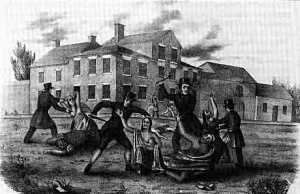Chapter 31: 302-314
Contents
Page 302
'One morning in late December...' December 28? or 29?, 1763 [see note for page 304]
Page 303
the Adonis
The allusion to extreme physical attractiveness is apparent in the psychoanalytical Adonis Complex which refers to a body image obsession with improving one's physique and youthful appearance. From WIKI
Market-place Drolls
Drolls are short comical sketches that originated during the Puritan Interregnum in England. With the closure of the theatres, actors were left without any way of plying their art. Borrowing scenes from well-known plays of the Elizabethan theatre, they added dancing and other entertainments and performed these, sometimes illegally, to make money. From WIKI
Page 304
The Restless Bee
a block and a half from where they are staying...must been near New Market...
Susurrus
A whispering, rustling, murmuring sound
'At Lancaster,-day before yesterday...
this puts the date of this section in question. The Massacre occured on Tuesday December 27, 1763, which would make the date of the page December 29th. However, Dixon says its "odd for Wednesday market" that it would be so quiet. This suggests Wednesday, December 28th as the correct day for this passage.
Lancaster County, known as the Garden Spot of America, is a county located in the south-central part of the Commonwealth of Pennsylvania, in the United States... The fourteen survivors of the tribe were placed in protective custody in the county workhouse, but the Paxton Boys returned on December 27, broke into the workhouse, and butchered the remaining Susquehannocks. The widespread sympathy in the frontier counties for the perpetrators of these acts made their discovery and arrest futile. From WIKI
Conestoga
Conestoga Township is a township in west central Lancaster County, Pennsylvania, United States. From WIKI
Paxton Vermin
See page 305.
Page 305
Matt Smith
Matthew Smith (also spelled Mathew Smith)—the dates of his birth and death apparently unknown—was a Pennsylvania politician. From WIKI
Revd. Stewart
John Stewart (1786-1823) was a missionary to the Wyandot Indians of Ohio and founder of what is often considered the first Methodist mission in America. Stewart was born in Powhatan County, Virginia to free Negro parents who were of mixed ancestry; a mix of white, black, and Indian. From WIKI
The Paxton Boys was a vigilante group that murdered at least twenty Native Americans in events sometimes called the Conestoga Massacre. Backcountry Presbyterian Scots-Irish frontiersmen from central Pennsylvania, near Paxton Church, Paxtang, Pennsylvania, now Dauphin County, formed a vigilante group in response to the American Indian uprising known as Pontiac's Rebellion. The Paxton Boys felt that the government of colonial Pennsylvania was negligent in providing them protection. From WIKI
Page 306
Moravian Brethren
The Moravian Church is a mainline Protestant denomination. Its religious heritage began in Kunvald late 14th century Bohemia (modern Czech Republic). Its official name is Unitas Fratrum meaning Unity of the Brethren (not to be confused with the small Unity of the Brethren church based in Texas). It is also occasionally referred to as the Bohemian Brethren. It places a high premium on Christian unity, personal piety, missions and music. The church's emblem is the Lamb of God with the flag of victory, surrounded by the Latin inscription: Vicit agnus noster, eum sequamur; or in English: "Our Lamb has conquered, let us follow Him." From WIKI
In fact, when word arriv'd...
this paragraph is a flashback to December 16, 1763.
Page 307
Time of Bushy Run
The Battle of Bushy Run occurred on August 5-6, 1763, in western Pennsylvania, between a British relief column under the command of Colonel Henry Bouquet and a combined force of Delaware, Shawnee, Mingo, and Huron warriors during Pontiac's Rebellion, 1763-65. From WIKI
General Bouquet
See page 277.
General Gage
Thomas Gage (1719 – April 2, 1787) was a British general, best known for his role in the early days of the American Revolution... From 1763 to 1775 he served as commander in chief of the North American forces, including the direction of the British response to the 1763 Pontiac's Rebellion. In 1774 he was also appointed the military governor of the Province of Massachusetts Bay, where his actions played a role in sparking of the American Revolutionary War in April 1775. After his failure to resolve the Siege of Boston he was replaced by General Howe in October 1775, and returned to England. From WIKI
Hospital Blankets us'd 'to convey the Small-pox to the Indians'...
As it turned out, officers at the besieged Fort Pitt had already attempted to do what Amherst and Bouquet were still discussing, apparently without having been ordered to do so by Amherst or Bouquet. During a parley at Fort Pitt on June 24, 1763, Ecuyer gave representatives of the besieging Delawares two blankets and a handkerchief that had been exposed to smallpox, hoping to spread the disease to the Natives in order to end the siege. William Trent, the militia commander, left records that clearly indicated that the purpose of giving the blankets was "to Convey the Smallpox to the Indians." From WIKI
Page 308
veins and reins
"reins" is the French word for "kidneys," carried over into early modern
English.
"Reins (rànz) pl.n.: 1. The kidneys, loins, or lower back."
http://www.answers.com/topic/reins
Page 310
Forks of Brandywine
The tributaries (themselves, colloquially, forks) of Brandywine Creek
drain the whole area, so it's a district.
'Tis too cloudy for Obs tonight...
this happened the night of December 29, 1763, supporting the 29th as the date for page 302. "Wednesday Market" is a mistake on Dixon's part.
Page 313
the white people...Eden
Cf. the White City in Against the Day and especially the 'reality' revealed around the White City with the 'reality' adumbrated in this whole paragraph as well.
hydraulick Looms
See Pynchon's essay Is it O.K. to be a Luddite for more on this topic.
